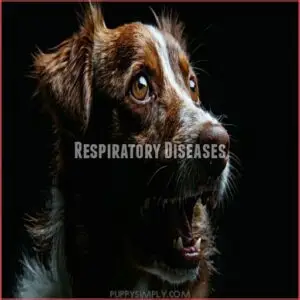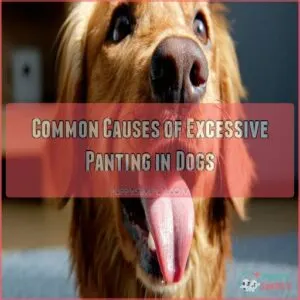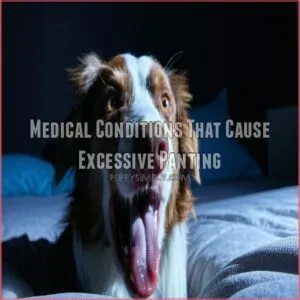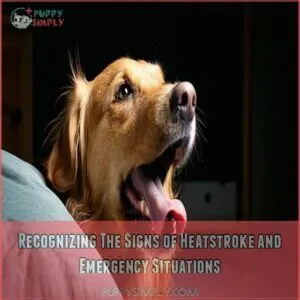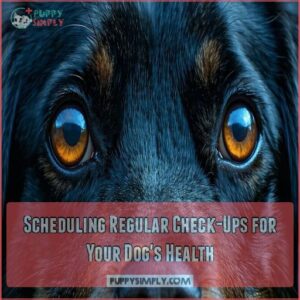This site is supported by our readers. We may earn a commission, at no cost to you, if you purchase through links.
 If your dog’s panting at night’s keeping you up, you’re not alone. While some panting is normal, excessive nighttime breathing could signal serious issues.
If your dog’s panting at night’s keeping you up, you’re not alone. While some panting is normal, excessive nighttime breathing could signal serious issues.
Dogs might pant due to anxiety, pain, or underlying health conditions like heart disease or heatstroke.
Watch for red flags: restlessness, unusual breath sounds, or gum color changes. Normal resting breath rates range from 15-30 per minute, so anything substantially higher warrants attention.
Environmental factors like heat, stress, or allergies can also trigger nighttime panting.
When in doubt, trust your gut—if something seems off, it’s time to consult your vet and unravel the mystery behind your furry friend’s midnight breathlessness.
Table Of Contents
- Key Takeaways
- Is My Dog’s Panting Serious?
- Why Do Dogs Pant at Night?
- Common Causes of Excessive Panting in Dogs
- Addressing Stress, Anxiety, and Environmental Factors
- Medical Conditions That Cause Excessive Panting
- When to Seek Veterinary Attention for Your Dog’s Panting
- Home Management and Care for Your Dog’s Panting
- Diagnosing The Cause of Your Dog’s Excessive Panting
- Treatment Options for Your Dog’s Excessive Panting
- Frequently Asked Questions (FAQs)
- Do dogs pant at night?
- How do I Stop my dog panting at night?
- Why does my senior dog pant at night?
- Why is my dog panting & restless at night?
- Why does my dog Pant when he sleeps?
- Why is my dog panting excessively?
- Why is my dog heavily panting at night?
- When should I worry about dog panting?
- Why is my dog restless and can’t settle?
- Why is my dog overheating at night?
- Conclusion
Key Takeaways
- You’ll want to pay close attention to your dog’s breathing patterns, as excessive nighttime panting could signal serious health issues like heart disease, anxiety, or underlying medical conditions.
- When your dog’s panting seems abnormal, look for red flags such as restlessness, unusual breath sounds, changes in gum color, or breathing rates outside the normal range of 15–30 breaths per minute.
- Creating a calm environment is crucial; you can help reduce your dog’s nighttime panting by managing room temperature, providing a cool sleeping area, minimizing stress triggers, and offering mental stimulation.
- Don’t hesitate to consult your veterinarian if you’re worried about your dog’s nighttime panting, as early detection and professional diagnosis can prevent potential health complications and ensure your furry friend’s comfort and well-being.
Is My Dog’s Panting Serious?
If your dog’s panting seems out of the ordinary, especially at night, it could be a red flag for serious health issues.
Understanding the difference between normal and excessive panting can help you determine when it’s time to call the vet.
potentially save your furry friend’s life.
Identifying The Signs of Abnormal Panting
Ever noticed your four-legged friend’s panting hitting panic mode? Identifying abnormal panting starts with keen observation.
Watch for red flags like intense restlessness, unusual breath sounds, and changes in gum color.
Rapid, heavy panting at night isn’t just noise—it’s your dog’s distress signal. When body temperature seems off or breathing becomes labored, it’s time to tune in and take action. Abnormal panting and distress signal.
Distinguishing Between Normal and Excessive Panting
What separates normal panting from excessive nighttime panting?
Your dog’s breed and age play big roles. Normal panting ranges from 15-30 breaths per minute at rest, spiking to 300 during exercise.
Watch for unusual patterns: heavy, persistent panting without clear triggers like heat or activity might signal something’s off.
Breed differences matter, especially for brachycephalic dogs who naturally pant more.
Recognizing The Need for Veterinary Attention
If your dog’s panting shifts from a gentle rhythm to an urgent, distressed pattern, it’s time to sound the alarm.
Pale gums, labored breathing, or a collapsed posture scream "emergency."
Nighttime panting that doesn’t calm down could signal serious illness.
Trust your gut: when breathing looks off, don’t wait. Your furry friend’s life might depend on a quick vet call.
Why Do Dogs Pant at Night?
If your dog’s nighttime panting has you wide awake and worried, you’re not alone in wondering what’s causing this unsettling behavior.
Understanding why dogs pant at night can help you determine whether it’s a harmless cooling mechanism or a signal that something more serious is happening with your furry friend’s health.
Heatstroke and Overheating
During scorching summer nights, your dog’s heatstroke risk skyrockets faster than a thermometer in Death Valley.
Watch for these critical warning signs:
- Excessive, rapid panting
- Bright red or pale gums
- Drooling and weakness
- Disoriented behavior
Immediate cooling becomes your lifeline. Drape wet towels, move to air conditioning, and offer cool water. Your quick action can mean the difference between life and potential tragedy.
Stress and Anxiety
After battling heatstroke risks, anxiety emerges as another sneaky culprit behind your dog’s nighttime panting. Stress can turn peaceful nights into restless marathons, leaving both you and your furry friend exhausted.
| Anxiety Trigger | Dog’s Response |
|---|---|
| Loud Noises | Trembling, Panting |
| Separation | Whining, Restlessness |
| New Environment | Pacing, Heavy Breathing |
Identifying these anxiety signals helps you tackle dog panting at night before it becomes a chronic issue.
Pain and Discomfort
Ever wonder why your furry friend’s nighttime panting might signal something more serious? Pain and discomfort can transform your dog’s breathing patterns into a distress signal.
- Subtle limping or reluctance to move
- Whimpering or changes in typical behavior
- Unexplained muscle tension or stiffness
Understanding these signs could be the key to catching arthritis pain or injury early, potentially saving your pup from prolonged suffering.
Respiratory Diseases
When respiratory diseases strike, your dog’s nighttime panting could signal serious breathing problems.
Pneumonia, bronchitis, and laryngeal paralysis can compromise oxygen intake, triggering intense panting.
Breed predispositions matter: Labradors and Golden Retrievers often face higher risks.
Watch for blue-tinged tongues or unusual breath sounds—these are red flags demanding immediate veterinary diagnosis and treatment options.
Common Causes of Excessive Panting in Dogs
Your dog’s nighttime panting could be more than just a quirky habit.
It might be a critical sign of underlying health issues.
If you’ve noticed your furry friend breathing heavily after dark, it’s time to understand the potential causes.
that could warrant an urgent vet visit.
Heart Disease and Anemia
If your dog’s panting sounds like a distress signal, heart disease and anemia might be the hidden culprits. These conditions can turn nighttime breathing into a challenging marathon for your furry friend.
Watch for these red flags: Pale gums indicating anemia, a condition that impairs oxygen delivery, which can also cause a heart murmur in dogs. Unexplained fatigue during previously enjoyable activities * Irregular breathing patterns disrupting peaceful sleep
Heartworm prevention and cardiac diagnostics could be your dog’s lifeline.
Cushing’s Disease and Adrenal Disorders
Something triggers Cushing’s disease in dogs, causing a hormonal hurricane that leaves your furry friend panting through the night.
This adrenal disorder disrupts your pup’s cortisol production, leading to pot-bellied appearances and increased thirst.
Veterinarians can diagnose Cushing’s through specialized tests, offering treatment options that help manage symptoms and improve your dog’s quality of life.
Cognitive Dysfunction and Canine Dementia
Your senior pup might be struggling with canine cognitive dysfunction, a sneaky condition that turns nighttime into a puzzle of sleep disturbances and nighttime pacing.
Imagine this progression of memory loss:
- Sudden confusion in familiar spaces
- Increased anxiety after dark
- Restless wandering through quiet rooms
- Unexplained whimpering or distant stares
These behavioral changes signal it’s time to chat with your vet about dog dementia treatment options.
Environmental Factors and Allergies
Just when you thought canine cognitive challenges were tricky, environmental factors can turn nighttime panting into a real rollercoaster.
Indoor allergens and humidity levels might be secretly sabotaging your dog’s comfort.
Seasonal allergies and temperature fluctuations can trigger unexpected respiratory responses, making your pup pant like there’s no tomorrow.
Check your home’s air quality and watch for subtle signs.
Addressing Stress, Anxiety, and Environmental Factors
Have you ever noticed your dog panting nervously at night, wondering what’s causing their distress?
Understanding the environmental triggers and stress factors that might be making your furry friend uncomfortable
can help you create a more peaceful nighttime experience for them.
Minimizing Stress and Anxiety Triggers
After exploring common health conditions, it’s time to tackle your dog’s stress head-on.
Identifying anxiety triggers can prevent nighttime panting episodes.
Watch for subtle signals like pacing, trembling, or wide eyes. Sudden routine changes, loud noises, or unfamiliar environments can spike dog panting stress at night.
Certain dog breeds such as herding, working, toy, sporting, and giant breeds may show higher anxiety tendencies, which can be addressed with dog anxiety medication alternatives.
Staying alert and responsive helps create a sense of safety for your furry friend.
Creating a Calming Environment for Your Dog
Every anxious pup needs a sanctuary where peace trumps panic.
Create a safe space with a quiet, cozy corner featuring a plush bed away from high-traffic areas.
Use soft, calming music and offer gentle touches to soothe your dog’s nerves.
A tranquil environment can substantially reduce nighttime anxiety and help minimize stress-induced panting.
Managing Environmental Temperatures and Humidity
Temperature control is a lifeline for dogs battling nighttime panting.
Create cool sleeping areas with strategic fan placement, ensuring air conditioning or well-ventilated spaces minimize humidity.
Keep fresh water nearby and use dog cooling mats to help your furry friend regulate body heat.
Your vigilance can prevent heatstroke and provide comfort during warm nights.
Reducing Noise and Distractions
Sometimes, your furry friend needs a tranquil environment to combat nighttime panting.
Create a quiet sleep space with soft bedding and gentle handling.
Use calming music or white noise to mask disruptive sounds. Minimize sudden movements and keep the area peaceful.
These steps can help reduce dog panting anxiety at night and provide a soothing atmosphere for your stressed companion.
Medical Conditions That Cause Excessive Panting
When your dog’s nighttime panting becomes more than just a quirky habit, it could signal serious medical conditions.
serious medical conditions that demand your immediate attention.
You’ll want to understand the underlying health issues that might be causing your furry friend’s distressed breathing.
and learn when it’s vital to pick up the phone and call your veterinarian.
Respiratory Diseases and Breathing Disorders
When breathing goes from bad to worse, your furry friend might be battling serious respiratory diseases that disrupt nighttime peace.
Canine asthma, lung infections, and laryngeal paralysis can trigger intense dog panting at night, accompanied by persistent coughing and labored breathing.
These dog respiratory problems demand immediate veterinary attention to prevent potential complications and restore your pup’s comfort.
Heart Disease and Cardiovascular Conditions
After breathing challenges come heart hitches. Your furry friend’s panting might signal serious cardiac troubles.
Heart murmurs can turn nighttime rest into a silent battle.
ECG insights reveal hidden cardiovascular risks that trigger irregular breathing.
Cardiac tests uncover treatment options, protecting your dog’s prognosis and lifespan. Your vigilance could be the heartbeat of early intervention.
Neurological Disorders and Cognitive Dysfunction
Neurological disorders can turn your dog’s peaceful nights into a restless puzzle, especially when cognitive dysfunction strikes.
Canine Cognitive Dysfunction (CCD) transforms senior dogs’ brain health, creating a maze of confusion and disrupted sleep patterns.
- Frequent nighttime panting and disorientation
- Unexplained anxiety during dark hours
- Sudden changes in sleep-wake cycles
- Persistent restlessness without apparent cause
Other Medical Conditions That Cause Panting
A handful of lesser-known medical conditions could be behind your dog’s mysterious nighttime panting.
Kidney disease, thyroid issues, and infections might trigger breathing problems that disrupt your pup’s sleep.
Obesity and heart disease can also cause respiratory challenges.
Allergies might contribute to nighttime discomfort, signaling it’s time to consult your veterinarian.
When to Seek Veterinary Attention for Your Dog’s Panting
When your dog’s panting goes from normal to concerning, it’s essential to know the red flags that signal a trip to the vet is necessary.
Your furry friend’s nighttime breathing patterns can reveal hidden health issues.
These hidden health issues demand immediate professional attention.
Recognizing The Signs of Heatstroke and Emergency Situations
Seeing your dog’s panting spiral into a potential heatstroke can feel like watching a ticking time bomb.
Recognizing heatstroke symptoms could save your furry friend’s life.
Here are critical signs to watch for:
- Excessive, rapid panting with dark red or purple gums
- Drooling excessively and showing signs of extreme distress
- Body temperature above 106°F with potential loss of consciousness
Identifying The Need for Immediate Veterinary Care
If your dog’s panting screams "emergency," don’t wait.
Watch for critical signs like blue or gray tongue, labored breathing, or sudden collapse—these signal urgent veterinary intervention.
Blue gums, extreme distress, or uncontrolled panting during nighttime could indicate serious conditions like heatstroke or respiratory failure.
When in doubt, rushing to the vet might just save your furry friend’s life.
Scheduling Regular Check-Ups for Your Dog’s Health
Recognizing potential health issues early can save your furry friend’s life.
Regular wellness visits help catch problems before they escalate, especially for dogs prone to nighttime panting.
Your vet can track changes, run preventative screenings, and provide customized veterinary advice for your dog’s unique health needs, ensuring they stay happy and comfortable as they age.
Home Management and Care for Your Dog’s Panting
When your furry friend’s nighttime panting keeps you both up, it’s time to take action and understand the underlying causes.
Creating a comfortable environment can make all the difference in managing your pup’s nocturnal breathing challenges.
Monitoring your dog’s health is also important.
Knowing when to seek veterinary care is crucial.
Providing a Cool and Comfortable Environment
After addressing potential emergency signs, creating a comfortable environment can help manage your dog’s nighttime panting.
Cool sleeping areas are your first line of defense against overheating.
- Position fans strategically to circulate air
- Use cooling mats for temperature control
- Maintain constant access to fresh, cool water
Your furry friend needs a chill zone that beats the heat and soothes their restless nights.
Offering Mental Stimulation and Exercise
Sometimes your dog needs more than just a comfy bed to beat nighttime anxiety.
Incorporating the calming trifecta, including activities like sniffing games, can help reduce stress.
Puzzle toys and daily walks can be game-changers for reducing stress and preventing dog panting at night.
Training games like fetch sessions and social playtime simultaneously tire out your furry friend but also provide key mental stimulation that helps combat anxiety and restlessness.
Monitoring Your Dog’s Breathing and Health
Your dog’s breath-tracking journal becomes your secret weapon against nighttime panting mysteries.
Monitor your pup’s respiratory rate, noting any unusual breath sounds or panting triggers.
Keep a log of nighttime episodes, tracking duration, intensity, and potential causes.
This detective work helps spot early warning signs of dog breathing problems or underlying health issues.
Administering Medication and Treatment as Prescribed
Follow medication schedules precisely to manage your dog’s nighttime panting effectively. Track dosage accuracy and watch for potential side effects carefully.
Consult your vet about treatment duration and specific instructions for nighttime medication, such as vet prescribed panting meds like those found here.
Regular follow-up appointments help confirm the treatment plan addresses the underlying cause of your dog’s respiratory distress.
Diagnosing The Cause of Your Dog’s Excessive Panting
If your dog’s nighttime panting is keeping you up and worried, you’re not alone in your concern about their health.
Understanding the root cause requires a systematic approach.
a thorough veterinary examination and careful observation of your furry friend’s symptoms.
Conducting a Physical Examination and Medical History
A detective’s keen eye matters when uncovering the mystery behind your dog’s nighttime panting.
During a physical exam and medical history review, veterinarians gather key clues about your furry friend’s health: signs of congestive heart failure, which can cause heavy breathing at rest or sleep.
Inspect overall body condition and weight, review recent behavioral changes, evaluate breathing patterns and respiratory sounds, check for signs of pain or discomfort, and document previous medical treatments and medications.
Understanding these details helps pinpoint potential causes of excessive nighttime panting.
Running Diagnostic Tests and Analyzing Results
Blood cells and hidden signals reveal the full story behind your dog’s nighttime panting.
Veterinarians rely on in-depth diagnostic tests like bloodwork analysis, ECG interpretation, and urinalysis to uncover potential health mysteries.
These intricate investigations map out your furry friend’s internal landscape, pinpointing underlying conditions that trigger excessive panting during those quiet, restless nights.
By using a dog blood test kit at home, pet owners can gather preliminary data to share with their veterinarian.
Identifying The Underlying Cause of Panting
After running those diagnostic tests, vets piece together your dog’s panting puzzle like detectives solving a mystery.
They’ll examine blood work, chest X-rays, and heart scans to pinpoint nighttime panting causes.
Each clue – from oxygen levels to hormone imbalances – helps uncover whether your furry friend’s breathing troubles stem from stress, disease, or something more complex.
Treatment Options for Your Dog’s Excessive Panting
When your dog’s nighttime panting becomes a cause for concern, it’s essential to understand the available treatment options that can help restore their comfort and health.
Your veterinarian can provide targeted interventions ranging from cooling techniques and medication to specialized therapies.
Addressing the underlying causes of excessive panting.
Managing Heatstroke and Overheating
Once you’ve pinpointed the signs of potential heatstroke, swift action becomes your lifeline.
Heatstroke in dogs isn’t just serious—it’s a ticking time bomb.
Here are 5 emergency cooling strategies to save your furry friend:
- Immediately move to a cool, shaded area
- Apply cool (not cold) water to their body
- Use wet towels or cooling mats
- Offer small amounts of cool water
- Monitor breathing and body temperature closely
Treating Respiratory Diseases and Breathing Disorders
When heatstroke fades, respiratory challenges take center stage.
Your vet might prescribe specialized breathing aids or medications targeting dog panting breathing problems.
Nebulizer treatments, oxygen therapy, and antibiotics can help manage conditions like pneumonia or bronchitis. Diagnostic methods reveal underlying issues, guiding targeted home care tips and preventative measures for your furry friend’s nighttime breathing struggles.
Frequently Asked Questions (FAQs)
Do dogs pant at night?
Dogs can pant at night for various reasons, including stress, anxiety, medical conditions, or environmental factors like heat.
If your pup’s nighttime panting seems unusual, it’s best to consult your veterinarian for proper guidance.
How do I Stop my dog panting at night?
Nearly 40% of dogs experience nighttime restlessness, but you can help.
Cool down your space, check for underlying health issues, and create a calm environment.
Consult your vet if panting persists, ensuring your furry friend’s comfort and peace.
Why does my senior dog pant at night?
Your senior pup might pant at night due to canine cognitive dysfunction, anxiety, pain, or underlying health issues like heart disease.
Consulting your vet can help identify the cause and provide comfort for your aging companion.
Why is my dog panting & restless at night?
Nighttime panting might signal stress, pain, or health issues like anxiety, cognitive changes, or underlying medical conditions.
Check your dog’s environment, monitor breathing, and consult a vet to rule out serious problems and guarantee comfort.
Why does my dog Pant when he sleeps?
Surprisingly, 60% of dogs experience occasional sleep panting.
When your furry friend pants during sleep, it could signal discomfort, stress, pain, or an underlying health condition.
This might need a vet’s expert evaluation.
Why is my dog panting excessively?
Excessive dog panting can signal health issues like stress, pain, heart problems, or heatstroke.
Check for other symptoms, monitor temperature, and consult your vet if persistent panting occurs.
especially when accompanied by restlessness or behavioral changes.
Why is my dog heavily panting at night?
Like a restless engine overheating, your dog’s nighttime panting might signal stress, pain, anxiety, or underlying health issues.
It’s essential to consult your vet for a thorough checkup.
nighttime panting might also indicate cognitive dysfunction, heart problems, or respiratory conditions.
When should I worry about dog panting?
You’ll want to call your vet if your dog’s panting is intense, persistent, or accompanied by signs like blue gums.
severe restlessness,
or changes in behavior that seem unusual or concerning.
Why is my dog restless and can’t settle?
Picture a furry tornado spinning circles at midnight.
Your dog’s restlessness might signal anxiety, pain, or underlying health issues.
Check for environmental stressors, recent changes, or potential medical concerns that could disrupt their peaceful slumber.
Why is my dog overheating at night?
Your dog might overheat at night due to high room temperature, excess weight, or underlying health conditions like Cushing’s disease.
Check room temperature, make certain of proper hydration.
and consult a vet if panting persists.
Conclusion
When your dog’s panting becomes a nocturnal symphony, it’s time to tune into their health.
Like a detective deciphering clues, you’ve learned that dog panting at night isn’t just background noise—it’s a potential SOS.
Trust your instincts, monitor your furry friend’s breathing, and don’t hesitate to consult your vet.
Your proactive approach can transform mysterious midnight puffs into peace of mind, ensuring your loyal companion stays healthy and happy through the night.





